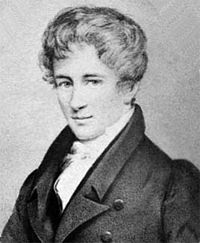On the segment of Jeopardy! (the popular North American quiz show with a long-time Canadian host that is watched around the English speaking world) that aired on 9 May 2013, as part of the Jeopardy! College Tournament, featured a category “The Abel Prize.”
As the first clue of the five explained, the Abel Prize, founded in 2003, is considered to be the “Nobel Prize” of mathematics.
The Abel prize is structured in much the same way as the Nobel prizes and has already honored some of the most distinguished mathematicians of our time.
As Wikipedia describes:
The Abel Prize is an international prize presented by the King of Norway to one or more outstanding mathematicians. Named after Norwegian mathematician Niels Henrik Abel (1802–1829), the award was established in 2001 by the Government of Norway and complements the Holberg Prize in the humanities, social sciences, law and theology.
It is a measure of Abel’s mathematical impact — despite a very short life — that abelian groups, varieties and integrals are all named after Abel; and that it is good style to use a small “a”. In mathematics, this only happens to the most important proper nouns.
We note that there are many explanations of why Alfred Nobel endowed no award for mathematics. Incidentally, the Economics prize is actually a Nobel Memorial Prize, endowed in 1968 by Sveriges Riksbank.
The five Jeopardy! clues were as follows:
- The Abel prize, the “Nobel Prize of Mathematics,” is presented annually in this city by the king of Norway. (Answer: Oslo)
- The 2009 prize went to Mikhail Gromov for his “revolutionary contributions to” this math branch pioneered by Euclid. (Answer: Geometry)
- 2011 laureate John Milnor won in part for “pioneering discoveries in” this, from Arabic for “reunion of broken parts.” (Answer: Algebra)
- Peter Lax won in 2005 for his “contributions to the theory and application of partial differential” these. (Answer: Equations)
- The first prize, in 2003, went to Jean-Pierre Serre, whose work helped Andrew Wiles prove this man’s famous “last theorem.” (Answer: Fermat)
The present authors were struck that this string of questions represented quite a departure from the usual game-show treatments of mathematics, which seldom venture beyond arithmetic problems and questions about a handful of famous mathematicians. In other words, unlike Jimmy Buffet’s song Math sucks, these clues were able to be entertaining without dumbing down the subject.
Indeed, Jeopardy! is no stranger to modern science, particularly in the computing arena, with its landmark hosting of a match between IBM’s “Watson” computer system and Jeopardy! champs Ken Jennings and Brad Rutter. Watson won the match handily, prompting Ken Jennings to write on his tablet “I, for one, welcome our new computer overlords.”
Indeed, the challenge of defeating human contestants on Jeopardy! was the spur for a very large (and expensive) five-year development effort by IBM. The Watson project had its genesis in 2004, when IBM executive Charles Lickel observed with wonder how patrons at the restaurant he was eating at thronged into the bar to watch Jennings compete on Jeopardy!, during his then unprecedented 74-match winning streak.
As we noted in a Math Drudge post, the real significant of the match goes far beyond merely a computer-vs-humans sparring match. Instead, the match demonstrated in unmistakable terms that artificial intelligence technology has advanced to the point that computers can rather well “understand” natural language queries. Note that even Google’s very successful search engine is not really able to understand sentences or questions — all it can do is to return links to webpages that contain a few of the words and phrases entered.
The technology developed for the Jeopardy! match is already being pursued by IBM to develop an intelligent physician’s assistant. More specifically, oncology — with all its expenses — has been the first announced target:
A year ago, a team at Memorial Sloan-Kettering started working with an IBM and a WellPoint team to train Watson to help doctors choose therapies for breast and lung cancer patients. (Medical News Today, Feb 2013)
Many other applications are waiting in the wings. Can an intelligent assistant for mathematical researchers be far behind?

